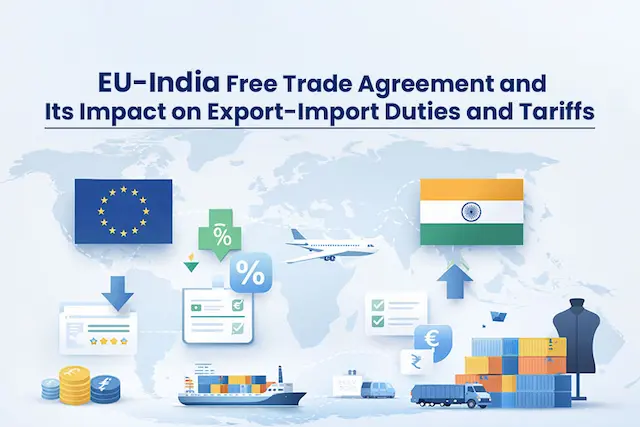For an exporter, there’s a time span between providing goods and services and receiving payment. During this period, the issue of working capital needs arises. Waiting is not an option at all; rather, trade finance comes to the rescue.
What exactly is trade finance? Trade finance is an umbrella term for financial tools like cash, credit, investments, etc., which is made available to exporters and importers to help them with trade. Among so many options available, post shipment export finance is one popular option among exporters. In this article, we will be sharing a comprehensive guide on post shipment credit to exporters.
What is Post Shipment Export Finance?
The Reserve Bank of India (RBI) defines post-shipment credit as: “Any loan or advance granted or any other credit provided by a bank to an exporter of goods/services from India from the date of extending credit after shipment of goods/rendering of services to the date of realization of export proceeds and includes any loan or advance granted to an exporter, in consideration of, or on the security of any duty drawback allowed by the government from time to time.”
Post Shipment Export Finance is financial assistance that is given to exporters post the shipment of goods, till the day of repatriation of the export proceeds. This credit service aims at bridging the gap between the time of shipment and the receipt of payment from the overseas buyer. Post shipment credit clears the capital constraints that a business might face due to delay in payment to continue with the business activities and fulfill more orders.
Different Types of Post-Shipment Credit Available to Exporters
Let’s understand the types of post-shipment credit available to exporters.
1. Export Bills Purchase, Discounted, Or Negotiated
Exporters can approach banks or financial institutions to sell their export bills at a discounted price before the due date. This allows them to receive immediate funds, enabling better cash flow management and meeting financial obligations.
2. Advances Against Bills for Collection
In cases where exporters have submitted export bills to banks for collection, they can request an advance against these bills. The bank provides a portion of the bill’s value as a loan, allowing exporters to access funds while waiting for payment from the overseas buyer.
3. Advances Against Duty Drawback Receivable From the Government
Exporters can avail of post-shipment credit by pledging their duty drawback receivables as collateral. The bank provides an advance against these receivables, ensuring exporters have access to funds while waiting for the government to process their duty drawback claims.
4. Advance Against Export on Consignment Basis
When exporters send goods on a consignment basis, they can request an advance from banks based on the expected proceeds from the eventual sale of these goods. This helps exporters manage their working capital needs and overcome liquidity challenges during the consignment period.
5. Advance Against Undrawn Balance
Exporters who have undrawn balances in their export invoices can request advances against these outstanding amounts. Banks provide funds based on the undrawn balance, allowing exporters to utilize these funds for their business operations or to fulfill other financial requirements.
Key Benefits of Post Shipment Credit
Here are 5 key benefits of availing post shipment credit finance:
1. Financial Stability
Financial stability is one aspect that post-shipment credit covers the best. It provides immediate cash that allows exporters to overcome their financial hurdles while they are waiting for payment to clear. Further, exporters can focus on other core areas of the business without worrying much about the cash part.
2. Cash Flow Management
Cash flow can majorly get disrupted due the waiting time between providing goods and services and waiting for the payment. Post shipment credit finance’s key feature of providing instant capital bridges the gap and helps exporters to cover expenses such as production costs, transportation, and marketing. It empowers exporters to continue their operations smoothly and fulfill their financial commitments.
3. Mitigating Credit Risks
International trade often comes with unforeseen risks, like non-payment or delayed payment from overseas buyers. Post-shipment credit mitigates this risk by making available instant funds, which removes dependency on waiting for the payment. This also makes sure the business is minimizing potential losses and making more profits.
4. Bigger Market Opportunities
With working capital stability that post shipment credit assures, exporters can now think of expanding their business zone and making more profits. The fund availability empowers them to take bigger orders, fulfill customer demands promptly, and establish a reputation for reliability and efficiency in the global market. It doubles their sales and increases growth opportunities.
5. Financial Options Flexibility
Tailored to exporters’ particular needs, post shipment credit comes with many financial options. These options can include export packing credit, post shipment finance, export factoring, or export credit insurance. Exporters are free to choose the best option based on their business’ nature, the volume of exports, and their risk tolerance. This freedom enables them to make stronger financial strategies.
Process of Availing Post-Shipment Credit
Here’s how the process of post-shipment credit goes:
Exporters apply for post-shipment credit. They provide necessary details and documentation.
They submit relevant export documents like invoices, bills of lading, and certificates of origin.
Banks evaluate creditworthiness, track record, compliance, and documentation accuracy.
If approved, the bank specifies the credit amount and terms.
The bank disburses the approved credit amount as a loan or line of credit.
Exporters use the funds for working capital, expenses, or financial obligations.
Repayment is made according to agreed terms, including schedule and interest rates.
Banks monitor fund utilization and ensure compliance with terms and conditions.
Exporters must comply with export regulations and customs requirements.
Renewal or extension can be sought for additional credit, subject to evaluation and approval.
Factors Considered By Banks and Financial Institutions for Granting Post-Shipment Credit
Banks and financial institutions consider several critical factors before granting post-shipment credit. Why? These factors unfold eligibility criteria and credit worthiness of the exporter.
Before everything else, the exporter’s creditworthiness is evaluated. It takes into consideration their financial stability and ability to repay. This includes checking their credit history, debt levels, and repayment capacity. Exporters with a solid credit profile and a track record of timely repayments are more likely to secure post-shipment credit.
Now, track records and experiences in undertaking successful export transactions come into play, which many financial institutions take very seriously. Financial institutions check their performance in meeting delivery schedules, fulfilling export orders, and maintaining customer satisfaction. An exporter with a positive track record is credited with higher trustworthiness and obtains post-shipment credit easily.
Lastly, banks takes documentation and compliance requirements into consideration. Exporters should provide accurate export documents, including invoices, bills of lading, and certificates of origin. Compliance with export regulations, customs procedures, and international trade laws is vital to mitigate risks. Exporters demonstrating meticulous attention to documentation and compliance increase their likelihood of receiving post-shipment credit approval.
By carefully considering these factors, banks and financial institutions can make informed decisions regarding post-shipment credit. Exporters should focus on maintaining a strong credit profile, building a positive track record, and ensuring meticulous adherence to documentation and compliance requirements to improve their chances of obtaining post-shipment credit.
Who all Are Eligible For Post Shipment Credit?
As per the norms of the Directorate General of Foreign Trade (DGFT), all types of exporters—like merchant exporters, manufacturer exporters, export houses, trading houses, and manufacturers supplying goods to merchant exporters, export houses, and trading houses—are eligible to apply for post-shipment credit. Also, access to this financial system doesn’t require any collateral.
Documents Necessary When Applying for Post-Shipment Credit
Various documents are necessary when applying for post-shipment credit. These documents include the bill of lading or airway bill, commercial invoice, certificate of origin, inspection certificate, letter of credit, insurance certificate, import-export code certificate, and packing list, among others. These documents work as evidence of the export transaction, providing important information such as the nature and value of the goods, their origin, and compliance with regulations.
To Conclude
In conclusion, post-shipment credit finance plays a vital role in supporting exporters by providing the necessary financial assistance during the period between shipment and receipt of payment. This comprehensive guide has shed light on the concept of post-shipment credit, its types, benefits, and the process of availing it. By understanding the factors considered by banks and financial institutions, exporters can better prepare themselves to meet the eligibility criteria. Credlix specializes in providing post-shipment credit finance solutions to exporters. With a focus on financial stability and cash flow management, we empower exporters to thrive in the global market.
Additionally, compliance with documentation requirements and export regulations is crucial for successful credit approval. With post-shipment credit, exporters can enhance their financial stability, manage cash flow effectively, mitigate credit risks, explore market opportunities, and enjoy the flexibility of financial options. By leveraging this credit facility, exporters can propel their businesses forward and thrive in the competitive global market.




